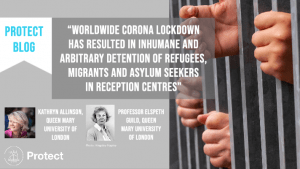By Prof Elspeth Guild, Queen Mary University of London and Kathryn Allinson, Research Assistant, Queen Mary University of London and Teaching Associate, University of Bristol.
 As the Covid-19 pandemic has tightened its grip on many western states, many refugees, asylum seekers, and migrants continue to be detained in reception and detention centres, without any prospect of release. With asylum processing at a standstill and returns to countries of origin on hold, detention of these individuals risks becoming arbitrary, if not inhumane.
As the Covid-19 pandemic has tightened its grip on many western states, many refugees, asylum seekers, and migrants continue to be detained in reception and detention centres, without any prospect of release. With asylum processing at a standstill and returns to countries of origin on hold, detention of these individuals risks becoming arbitrary, if not inhumane.
“Everyone lawfully within the territory of a State shall, within that territory, have the right to liberty of movement and freedom to choose his residence”, states article 12(1) of the International Covenant of Civil and Political Rights (ICCPR). The liberty of movement is a human right – a right that has been severely curtailed since the outbreak of the Covid-19 pandemic.
In order to reduce disease dissemination, states worldwide have put in place severe travel and movement restrictions, affecting both internal and external travelling. Article 12(1) is a qualified right and so exceptions can be made in the context of public health necessity. These restrictions have resulted in lockdowns in countries around the world, confining people to their homes with only specific exceptions permitted. (more…)
